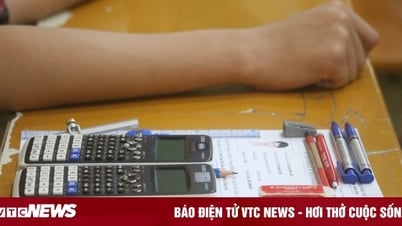Ms. Vu Thi Trang (Hai Ba Trung District, Hanoi ) said that recently, the authorities have increased tax management from personal accounts, making her worried that any money transferred to a bank account could be considered income and subject to tax.
"I often have some real estate transactions. Therefore, I am very worried about whether I will have to pay additional taxes when receiving money from real estate sales through my personal account or not? Because before receiving the money, I had to fulfill all tax obligations such as personal income tax, registration fees..." , Ms. Trang wondered.
Regarding this issue, the Tax Department has affirmed that not all money transfers require tax payment. People need to clearly understand the information to avoid confusion and anxiety.
There are at least 9 common cases where people are completely exempted from tax when receiving money. In particular, in the case of individuals selling real estate and having fully fulfilled their previous tax obligations (personal income tax, registration fees, etc.), the amount of money transferred for payment later will not be taxed again. However, if it is discovered that the price is declared low to evade tax, the tax authority has the right to collect the difference.

Many people wonder whether the money received through the account after selling a house or land that has fulfilled its previous tax obligations must continue to pay tax a second time or not? (Illustration photo)
In addition, there are 8 other cases where tax is not required when receiving money via bank transfer. Specifically:
Borrowing between relatives and friends - not taxable income
Personal money received from relatives and friends for the purpose of borrowing, supporting and helping is defined by law as a civil relationship, does not generate income and is therefore not subject to tax. However, to avoid misunderstandings, the person transferring money should clearly state the content such as: "borrowing money", "temporary help", "transferring money to borrow money".
Get money to pay off bank loan
People who borrow money from banks when it is due often ask relatives to transfer money on their behalf to pay it off before borrowing again. The money transferred into the account for this technical purpose does not generate personal income and is therefore not taxed.
Remittances - money sent from relatives abroad
Money sent by relatives from abroad, also known as remittances, is exempted from tax under Vietnamese law to encourage foreign currency sources. This amount is not considered personal taxable income if sent through official channels such as banks or legal money transfer companies.
Collection and payment activities
Individuals who work as shippers, cash on delivery (COD), or receive money and then pay it back under authorization (for example, gas station employees collecting money for companies) do not have to declare personal income. The reason is that these amounts are not real income but only intermediary transactions.
Receive and transfer money without charging fees
When you transfer money for someone else and don't charge any fees, the money that goes into your account is not taxable. However, if you charge a fee, the service fee may be subject to income tax (~5%–7%).
Tax deducted salary - transfer to relatives
After-tax wages that an individual transfers to his or her spouse or other relatives are not considered new income. Therefore, the recipient will not be taxed again. It is important to prove that the source of the money is wages that have been deducted according to regulations.
Overseas salary - local tax paid
Vietnamese workers working abroad who have paid taxes in the host country will be exempt from personal income tax when transferring money back home. The condition is that they must have documents proving that taxes have been paid and transferred through an official bank.
Interest on small personal loans - tax-free
When an individual lends money to another person in a civil form (family, association, friends, relatives, etc.) without interest or with small, irregular interest, it is not considered a business and therefore does not have to pay tax. However, if the lender lends money to a business or organization and receives interest periodically, the lender may have to pay a 5% tax on the interest.
"Receiving money transfers is no longer a purely private activity, but can become the basis for tax authorities to review individuals' financial obligations. However, not all money transferred to an account is taxed. Understanding the 9 tax-exempt cases will help people, self-employed people and overseas workers be more proactive in financial transactions.
It is important to be transparent: clearly document the transfer, keep relevant documents (if any), and seek additional advice from an accountant or lawyer for large or recurring transactions. Don't let "clean money" accidentally become trouble because of ignorance or negligence in recording and managing cash flow , "experts note.
Regarding this issue, the representative of the Tax Department affirmed that the tax authority does not include in taxable revenue amounts transferred and received between individuals (such as giving and receiving) that are not related to transactions of buying and selling goods, giving rise to tax obligations.
Source: https://vtcnews.vn/nhan-tien-ban-nha-dat-qua-tai-khoan-co-phai-nop-thue-ar950600.html



![[Photo] Close-up of modernized Thu Thiem, connecting new life with District 1](https://vphoto.vietnam.vn/thumb/1200x675/vietnam/resource/IMAGE/2025/6/24/d360fb27c6924b0087bf4f288c24b2f2)



![[Photo] The 9th Party Congress of the National Political Publishing House Truth](https://vphoto.vietnam.vn/thumb/1200x675/vietnam/resource/IMAGE/2025/6/24/ade0561f18954dd1a6a491bdadfa84f1)



























































































Comment (0)